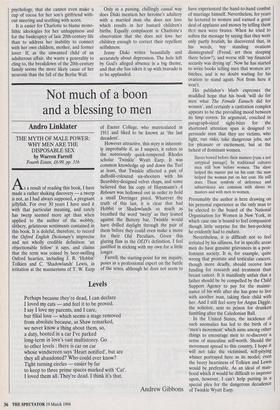Not much of a boon and a blessing to men
Andro Linklater
THE MYTH OF MALE POWER: WHY MEN ARE THE DISPOSABLE SEX by Warren Farrell Fourth Estate, £6.99, pp. 316 As a result of reading this book, I have made a rather shaking discovery — a twerp is not, as I had always supposed, a pregnant jellyfish. For over 30 years I have used it with that particular meaning, and rarely has twerp seemed more apt than when applied to the author of the wobbly, slithery, gelatinous sentiments contained in this book. It is doleful, therefore, to record the Oxford English Dictionary's imprecise and not wholly credible definition: 'an objectionable fellow' it says, and claims that the term was coined by beer-swilling Oxford hearties, including J. R. 'Hobbit' Tolkien and C. 'Shadowlands' Lewis, in irritation at the mannerisms of T. W. Earp of Exeter College, who matriculated in 1911 and liked to be known as 'the last decadent'.
However attractive, this story is inherent- ly improbable if, as I suspect, it refers to the notoriously quick-tempered Rhodes scholar 'Twinkle' Wyatt Earp. It was common knowledge up and down the Turl at least, that Twinkle affected a pair of daffodil-coloured six-shooters with his Beardsley-designed velvet chaps, and some believed that his copy of Huysmann's A Rebours was hollowed out in order to hold a small Derringer pistol. Whatever the truth of this last, it is clear that had Hobbit or Shadowlands so much as breathed the word 'twerp' as they leaned against the Buttery bar, Twinkle would have drilled daylight through the pair of them before they could even make a move for their Old Peculiars. Given this glaring flaw in the OED's definition, I feel justified in sticking with my own for a little longer.
Farrell, the starting-point for my inquiry, poses as a professional expert on the battle of the sexes, although he does not seem to have experienced the hand-to-hand combat of marriage himself. Nevertheless, for years he lectured to women and earned a great deal of applause and money by telling them that men were brutes. When he tried to soften the message by saying that they were only partly brutish, he discovered that, in his words, tiny standing ovations disintegrated' (Freud, art thou sleeping there below?), and worse still 'my financial security was drying up'. Now he has started to write books telling men that women are bitches, and is no doubt waiting for his ovation to stand again. Not from here it won't.
His publisher's blurb expresses the muddled hope that his book 'will do for men what The Female Eunuch did for women', and certainly a castration complex appears to be the prevailing mood between its limp covers. Its argument, couched in paragraph-sized sight-bites for the shortened attention span is designed to persuade men that they are victims, who fight, run risks, take dangerous jobs, not for pleasure or excitement, but at the behest of dominant women.
Slaves bowed before their masters [runs a not untypical passage]. In traditional cultures men still bow before women. The slave helped the master put on his coat: the man helped the woman put on her coat. He still does. These symbols of deference and subservience are common with slaves to masters and with men to women.
Presumably the author is here drawing on his personal experience as the only man to be elected to the board of the National Organisation for Women in New York, in which case one is bound to feel compassion though little surprise for the hen-pecking he evidently had to endure.
Nevertheless, it is difficult not to feel irritated by his silliness, for in specific areas men do have genuine grievances in a post- feminist society. It is, for example, quite wrong that prostate and testicular cancers, though more deadly, should receive less funding for research and treatment than breast cancer. It is manifestly unfair that a father should be be compelled by the Child Support Agency to pay for the mainte- nance of his wife after she has gone to live with another man, taking their child with her. And I still feel sorry for Angus Diggle, the solicitor, sent to prison for drunken fumbling after the Caledonian Ball.
In the United States, the incidence of such anomalies has led to the birth of a `men's movement' which aims among other things to encourage men to re-discover a sense of masculine self-worth. Should the movement spread to this country, I hope it will not take the victimised, self-pitying whiner portrayed here as its model; even the beery heartiness of Tolkien and Lewis would be preferable. As an ideal of man- hood which it would be difficult to improve upon, however, I can't help putting in a special plea for the dangerous decadence of Twinkle Wyatt Earp.


























































 Previous page
Previous page